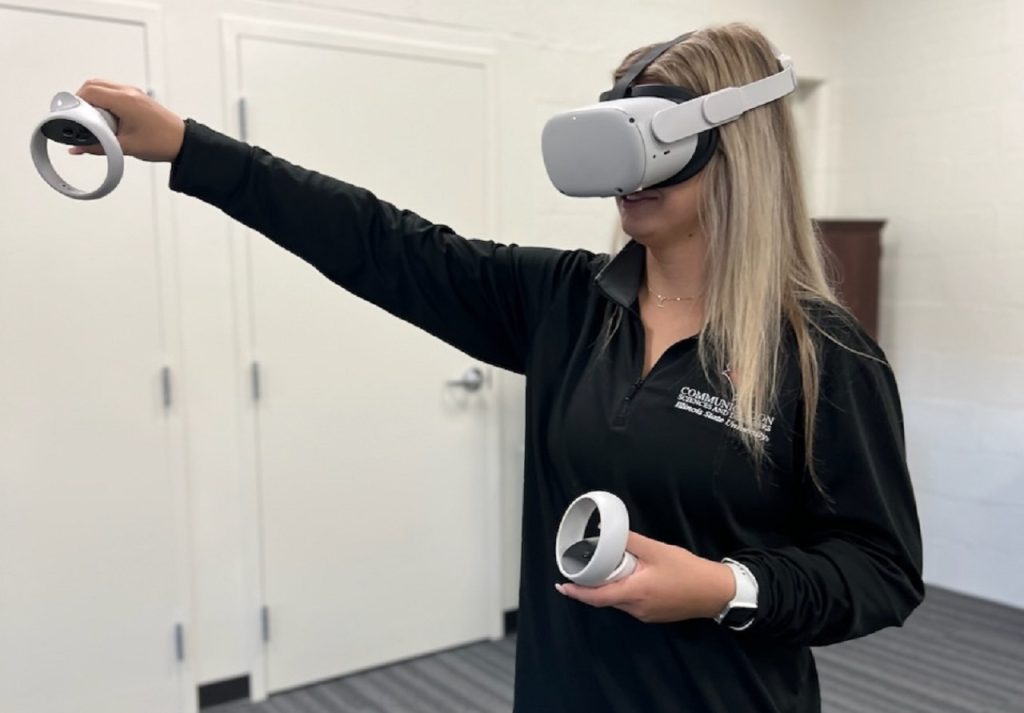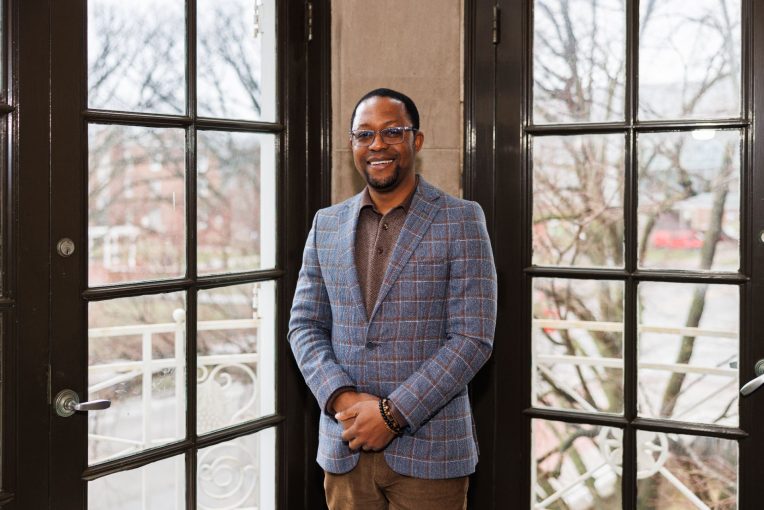As chair of Communication Sciences and Disorders at Illinois State University, McLoddy Kadyamusuma prides himself on empowering students to help people communicate.
Graduates can become speech-language pathologists who are involved in the prevention, evaluation, and treatment of people with communication disorders or audiologists who help people with hearing, balance, and related ear problems.
Kadyamusuma arrived at Illinois State in the summer of 2022, not from his native country of Zimbabwe but from New York state, where he was chair and program director at State University of New York in Fredonia, near Buffalo.
He was educated first in his home country, where he studied linguistics and French. He then earned a master’s degree in clinical linguistics studying in Italy, Germany, and the Netherlands before earning his Ph.D. in neurolinguistics in Potsdam, Germany. Following a post-doc in South Africa, he came to America as a visiting scholar at the City University of New York.
Kadyamusuma, who is married and has three kids, knew from the start that he wanted a career in academia. Recently, he took time to discuss his journey and the importance of the study of Communication Sciences and Disorders.
“Communication Sciences and Disorders is one of those helping professions. Seeing that joy that comes to people, for example, when you’re working with a child who has trouble speaking or is delayed in speaking. You help them, and it brings that joy to them and to their parents.”
McLoddy Kadyamusuma
What made you decide to join Illinois State University to lead the Department of Communication Sciences and Disorders?
I was already a chair in Fredonia and had been the assistant chair from 2018-19 and then chair from 2019-22. Illinois State is a much larger university, and I was looking for progression and a challenge. In my previous position, we had bachelor’s and master’s degrees, a speech language pathology clinic, but not an audiology program. I was looking for more growth, and this a better ranked program here. On the clinical side we have a larger clinic here where we service more clients. And our undergraduate program is larger than the entire program at Fredonia. This move has allowed me to stretch myself. I’m very happy to be here.
What makes this profession important?
It’s one of those helping professions. Seeing that joy that comes to people, for example, when you’re working with a child who has trouble speaking or is delayed in speaking. You help them, and it brings that joy to them and to their parents. Or you help a stroke victim who is struggling to speak again, or you help an autistic child learn to communicate. It’s very fulfilling in that you can see the result of your work. It affects the quality of life for the person you are helping and the people around them.
It’s the same on the audiology side where you help someone experience the world in a better way. That’s the biggest joy when you help people function in their communication, which includes hearing and balance, speaking, writing, and reading.
What inspired you to follow this career path?
I was looking for a dissertation topic, and I wanted to do something that is applied. My cousin had an unfortunate motor vehicle accident that involved a brain stem injury, and he was conscious but only at an emotional level. He was a quadriplegic, and he could not communicate. That piqued my interest that there was this disconnect between his brain and his ability to speak. I wanted to know what happens when the brain is damaged, especially the part that controls language.
Ever since my cousin passed away after those two weeks in the hospital, my work has been dedicated to him because he brought me to this field.

What can prospective students expect if they choose to study Communication Science and Disorders at Illinois State?
This is a strong and competitive program, especially at the undergraduate level. There are a lot of opportunities for working in labs with your professors, and the individualized attention that we talk about is real. We have a very high retention rate of 97.3 % over the last five-year period, so when students choose ISU, they stay. Almost all our students get into graduate school, and they will need a master’s degree or clinical doctorate. We pride ourselves that we offer 35 positions for the master’s program and 10 for the audiology doctorate program. We have very good career pathways established, and we prepare them to be ready for their careers.
We have opportunities for independent study and for study abroad in Germany, Switzerland, and Italy. And we send graduate students to Belize to provide services during winter break. Students can join the National Student Speech Language Hearing Association and the Student Audiology Association to help connect to the community and feel a sense of belonging.
You should also come to ISU because we don’t just talk about equity, diversity, and inclusion (EDI) here. I try to infuse it into every course. We make every effort to give our students the support they need to be successful.
What is the focus of your research, and how do you integrate it into your teaching?
Because of my background with multiple languages, I’ve always been passionate about coming up with assessments for people who speak multiple languages. It’s important to assess people in every language they speak. In Zimbabwe we are multi-lingual by nature. For example, Shona is my first language, then Ndebele, and English. I came up with multi-lingual assessment tools, and this informs my research.
We are heavy into EDI, so students learn that when they treat their clients here in the U.S., a multi-ethnic society, they will encounter many dialects. So, you can’t assume what you use for one group will work for all groups. Part of my work is to come up with culturally equivalent items that can be used to assess the same things among different groups. For instance, you can’t show people in Zimbabwe an image of an igloo and expect them to know what that is when they’ve never seen snow.
Bonus question. This is a two-fold question: You’ve lived all over the world, what do you like about Central Illinois, and what is something about you that would surprise your students and colleagues?
I wasn’t prepared for the flatness of the land, and there’s nothing but corn and soybeans here. I am also really surprised by the warmness and the genuineness of the people. I’ve lived a lot of places, but I have never felt so welcome as I do here. And it carries over to my work which is so collegial. It makes a big job so much easier.
It might surprise people to learn that I am an avid runner. I run at least three times a week. I run the equivalent of a half marathon one day every week. Then I run 10 miles one day, and the last day is a 6-mile run. Exercising is big for me. I also love music, and I always have it on when I’m working and at home. I even play acoustic guitar. Lastly, I miss the snow. If it’s going to be cold, we might as well have snow. When the sun is out it’s pretty.

